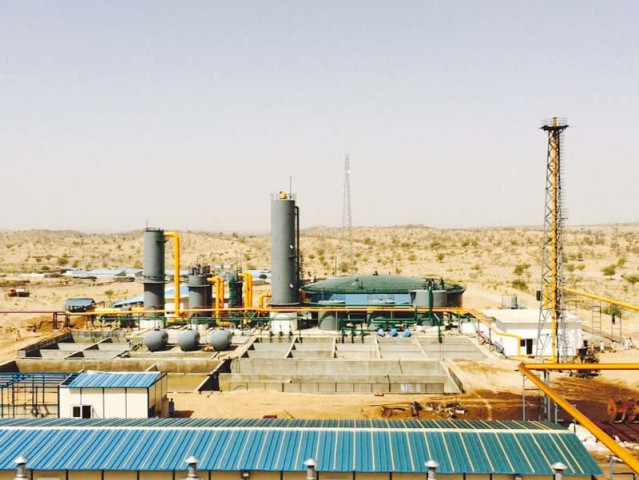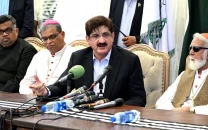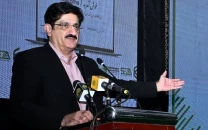Thar coal power plant to start operation in December, says CM
Warns against attempts to roll back 18th Amendment

Thar Coal power plant
PHOTO: EXPRESS/FILE
The CM said that the achievement of open pit mining, installation of a coal-fired power plant and the production of electricity has a long and painful history. "The coal mining and coal-based power project plan was initiated by Shaheed Mohtarma Benazir Bhutto during her second tenure. But the successive governments not only scrapped the project, but also dishonoured international commitment," he said, adding that this is why no international firm was ready to invest in Thar.
Thar coal project set to start running ahead of schedule
He said that when all the doors were closed, the provincial government in partnership with Engro formed a company and started mining work. "With the help of Almighty Allah, coal has been produced from the mine and the coal-based power plant is also at the completion stage and in December, 2018 we will start producing electricity from the coal," he said proudly.
He shared that the Sindh government has invested over one billion dollars to develop the road network, airport and other facilities in Thar which has now become a land of opportunities where investment in coal mining, power generation, tourism, hotel industry, transport, and other sectors is actively attracting investors.
The CM explained that there were other factors which also affected development in Thar. He said that a question could be asked that when an area has been developed and billions of dollars' investment is taking place, then why is poverty on the rise and why are children are dying?
Replying to the question he had raised himself, Shah said that poverty is the result of drought. A large portion of the population lives in the desert. Their livelihood depends on rainfall and they grow millet, sorghum and other such crops when it rains heavily, but when it doesn't, people start migrating and during the migration their cattle and children die. He added that the cause of children's death was early marriages, malnutrition and lack of awareness. Often weak children are born there and the ratio of pre-mature births is also high.
He said the children who are born at home by untrained traditional daies are taken to hospitals where they cannot survive. However, this child death ratio is not as high as is being propagated, he said.
"We have started distributing wheat free-of-charge, launched a nutrition programme and upgraded all the tehsil and district hospitals where all facilities are available," he added.
On terrorism
The CM also spoke on the issue of terrorism. Historically, Sindh has been a land of peace and tranquillity and a seat of learning, but with the passage of time and because of wrong policies, the province, particularly Karachi, has suffered a lot due to terrorism, he said. The CM added that he was proud to say that Sindh has not produced any terrorists but all the terrorists came from other areas. "Oh yes, the wave of extremism also affected this land of Sufis and some facilitators of terrorists emerged here and they inflicted serious damage to the social fabric, economy, education and other sectors," he said, adding that a targeted operation was launched against terrorists, target killers and extortionists and its results have been good. Street crime, the CM opined, was now a big challenge and a policy has been launched to counter it squarely and it will be eliminated.
Civic facilities
The CM said that after restoring law and order, the dilapidated infrastructure of the Karachi including under passes and overhead bridges have to be reconstructed. The delayed K-IV bulk water supply project and the S-III project along with other water treatment projects have been initiated. "We have also launched a public transport project and Inshallah the Karachi Circular Railway (KCR) project will also see light of day shortly," he said.
Replying to a question, the chief minister said that water shortage has badly affected the ecology of the Indus delta. Our river system has not enough water that new dams can be constructed. "The solution of water shortage can be controlled through conservation and a change in the cropping pattern," he said. "We will have to switch over to low delta crops and canal lining," he explained, adding that this year the kharif season faced water shortage, and a prediction of 40% water shortage has been made for the next kharif season. This kind of situation goes on year after year and only once in 10 to eight years floods are received, how then are new dams to be constructed, he asked. "We do not oppose dams but our stance is very clear," he said.
Replying to another question on the 18th Amendment, the CM claimed that the 18th Amendment has strengthened the federation. After the 18th amendment, provincial governments have become administratively, financially and democratically stronger, and its fruits are being harvested by all the provincial governments, he said.
There are some people who believe in centralization of powers and they are opposing the 18th Amendment, he said. "We would strongly oppose any attempt to roll back 18th amendment," he said, adding that in a modern democracy, powers are devolved.
Thar coal may become uncompetitive if high cost trends continue
The programme was attended by Chief Secretary Mumtaz Ali Shah, Planning and Development Chairperson Muhammad Waseem, Inspector-General Syed Kaleem Imam and provincial secretaries.
NDU's chief instructor, Rear Admiral Zain Zulfiquar, thanked the CM for meeting his delegation and presented him with a memento. The CM also presented a memento to Zulfiquar.
Published in The Express Tribune, October 18th, 2018.



















COMMENTS
Comments are moderated and generally will be posted if they are on-topic and not abusive.
For more information, please see our Comments FAQ